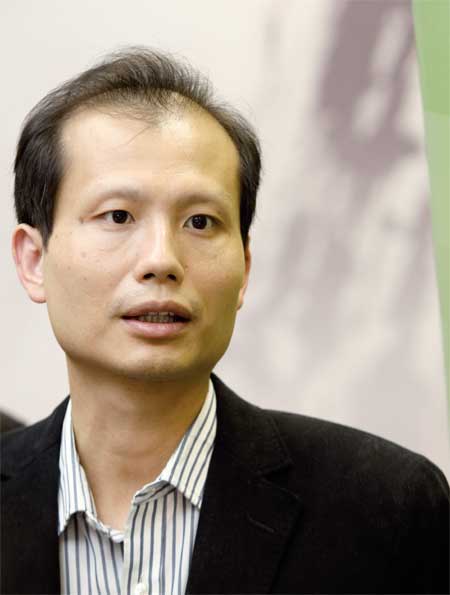Darwin's chow chow makes big bow-wow
|
"I'm cool with what I'm doing," says Fang Zhouzi when asked if he enjoyed hunting down fake intellectuals or regarded it more as a rod on his back. "A man can't stay angry all day every day." |
He's a devoted crusader against "corruption in ivory towers."
He's also a relentless satirist, a cruel, bullheaded fighter who takes no prisoners and shows no mercy.
He dodged assassins sent by a bitter, discredited urologist and called a pop singer "superstitious" for marveling at a Buddha statue that had survived a high-rise fire.
He's a man described as both evil and righteous, a nightmare, some say, for academic plagiarizers, although others suggest he tends to tackle softer targets without confronting the harder issues.
Fang Shimin, better known by his pen name of Fang Zhouzi, founded the Chinese language e-magazine New Threads in 1994 when he was studying biochemistry at Michigan State University.
Within a few years, New Threads would transform into China's first, and arguably only, independent research ethics investigation body that enlists volunteer watchdogs to identify fraud, plagiarism and false credentials.
Fang was awarded a doctorate in 1995. Instead of working full-time as a biochemist in a lab or pharmaceutical company, he quit to write about science for lay audiences and hunt down the miscreant academics of China.
"I'd probably make a decent scientist," Fang says, recalling how he cut short his postdoctoral studies on molecular genetics at the Salk Institute for Biological Studies, California, in 1998 to become a full-time writer.
"I liked writing. Plus China already had a surplus of scientists, but not enough people to explain science to the general public."
In his first book The New Interpretation of Evolution (1997), Fang presented to Chinese readers new understandings of life gained through genetic studies and in defense of Darwin's grand theory.
Far from undermining evolution as believers of intelligent design had claimed, scientific discoveries such as gene mutations only strengthened the case for, he argued.
"Growing bones in a fish fin [to evolve into a leg] is a one-step job that requires one or a few gene mutations, not intermediate morphologies going from a tenth of a bone to two-tenths of a bone, etc.," he wrote.
The theme of devotion to science resonates throughout his later writings.
"What is so boring about science for so many people?" Fang posits in the foreword to Fang Zhouzi Brings You Close to Science (2007).
"Science tells us about everything from quarks to the universe. It reveals to us who we are and where we are from. It shows us the way to a healthy life…Who could find these questions boring?"
Fang is famous for saying on various occasions that science alone answers the questions about life that philosophy and religion cannot.
"Of all the things I have done in my life, I would like to be remembered for these books more than anything else," he says.
"I think of Darwin as the greatest scientist of all time. He laid the foundation for the science of life as we know it today."
Fang has dispatched himself on a one-man crusade to promote the scientific mode of thinking in China, much like Thomas Henry Huxley and Richard Dawkins have tried in the Western world.
Huxley was dubbed "Darwin's bulldog" for his work popularizing the theory of evolution during the 19th century, while Dawkins the British atheist and evolutionary biologist is "Darwin's Rottweiller."
"Dawkins is of course a lot more accomplished than me as a scientist and a science writer," Fang says.
He wouldn't mind following Huxley and Dawkins into Darwin's doghouse, he jokes, as long as he isn't portrayed as a fluffy Pekinese. When the reporter suggests a chow chow, the Chinese dog famous for its strong-willed character, Fang accepts.
Fang's career hit a more aggressive level in 2000 when New Threads started to investigate academic misconduct in China. Fang's militant posture soon made him enemies, some of them violent.
The New Threads website receives a tip every few days and has dealt with some 1,000 cases in 11 years.
In a country with no properly functioning academic integrity committees, Fang administers his own a self-executed brand of justice based on his judgment as a scientist and the evidence he has collected.
Access to the website goes down intermittently on the Chinese mainland and a Google search with the keywords "New Threads" in Chinese returns an error notice.
 0
0 








Go to Forum >>0 Comments